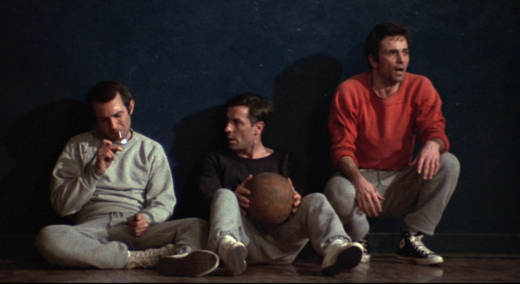Billed
as “a comedy about life, death and freedom”, John Cassavetes’ third major work Husbands
– originally released in 1970, to generally indifferent reviews – opens with
snapshots of a pool party at which the women mind the children, while their
other halves flex their muscles, goofing around for the cameras. Cut to: the
funeral of an acquaintance, at which these same men suddenly seem at a loss.
The grave, it seems, is calling. Their elected response – which is that of men
throughout the ages – is to get wholly blotto and sack off work, with the intention
of swinging around New York and recapturing their former glories. They play
sports, only to tire themselves out; at a lock-in, they sing the songs of their
youth, before getting sore-headed and abusive.
In
their deathly black overcoats, these three carousers (Ben Gazzara, Peter Falk
and Cassavetes himself) form the inverse of the boyish sailors in On the Town: that film’s post-War
optimism has here been replaced by sourness and regret, a sense these guys’
better days are long gone. Cassavetes boxes in his characters in dense,
concentrated blocks of capital-A Acting. We’re watching men pretending to be
that which they’re not (young, carefree, studlike), and seeing the first
stirrings of that recurring 70s theme of male entrapment. Yet unlike Nicholson
in Cuckoo’s Nest or de Niro in Raging Bull, this trio lack the
self-awareness to realise the state they’re in: even after fleeing to London,
they end up in a rain-lashed hotel suite, signally failing to connect with
their would-be conquests.
For
all this, Husbands really is grimly
funny, as the sight of men being pathetic often is: the leads nail their casual
camaraderie to the screen, bickering and roughhousing like a shabbier Three
Stooges. At two hours plus, it remains equal parts bracing and exhausting – a
film seemingly designed to drive viewers to teetotalism and back into the
missus’s arms – but it’s assumed an added poignancy, now that all three of its
leads have succumbed to the grave themselves. From Gazzara’s very real and very
adult explosions of rage – during which not even the camera operator knows how
to react – you can see what the American cinema has lost over the past four
decades: it feels an awful long way down from this to, say, The Hangover, which presented its
bacchanalia as mindless entertainment, and expected us to cheer for its losers.
Husbands opens in selected cinemas from today.

No comments:
Post a Comment